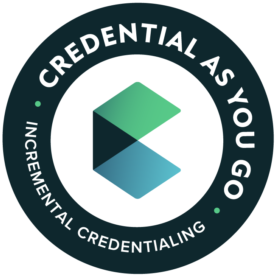It is critical to gather data on how your organization structures and implements learner support services for learners seeking incremental credentials. The following questions and considerations will help you assess—and then improve—your institution’s approach:
1. Who is being left out by policies supporting incremental credentials? What supports are in place for non-matriculated learners who seek incremental credentials?
2. What is the learner experience at your institution? What hurdles face learners as they attempt to enroll in incremental credential programs? What challenges are they facing at home, work, or in their communities?
3. Which components of learner support are most important to your incremental credentials?
4. How does the institution address the needs of veterans, active-duty service members and their families?
5. Do you have a way educate learners about available support services and how to obtain them?
6. How are you developing culturally responsive learner supports?
7. Do you have a plan for offering academic services to your learners? Consider two particularly important areas:
8. What are your approaches to providing financial support services? Consider these important areas:
9. How do you provide support services at various incremental steps in learners’ education and career journeys?
10. How do you provide personalized support services to learners?
11. How do you provide inclusive support services?
12. What external partners (community-based organizations, governmental agencies, nonprofits, etc.) might you collaborate with or refer to and thus expand delivery of support services?

Credential As You Go has acquired three phases of funding to date. Lumina Foundation funded Phase I, resulting in the Incremental Credential Framework for testing. The Institute of Education Sciences, U.S. Department of Education funds Phase II (Grant R305T210063), which focuses on rapid prototyping of and research on incremental credentials with a national campaign. An anonymous private donor fund at the Program on Skills, Credentials & Workforce Policy at George Washington University funds the development of the prototype Learn and Work Ecosystem Library. Walmart funds Phase III, which focuses on systems change for expansion and sustainability of incremental credentials. The opinions expressed are those of the authors and do not represent views of Lumina Foundation, Institute of Education Sciences, the U.S. Department of Education, Walmart, or George Washington University.